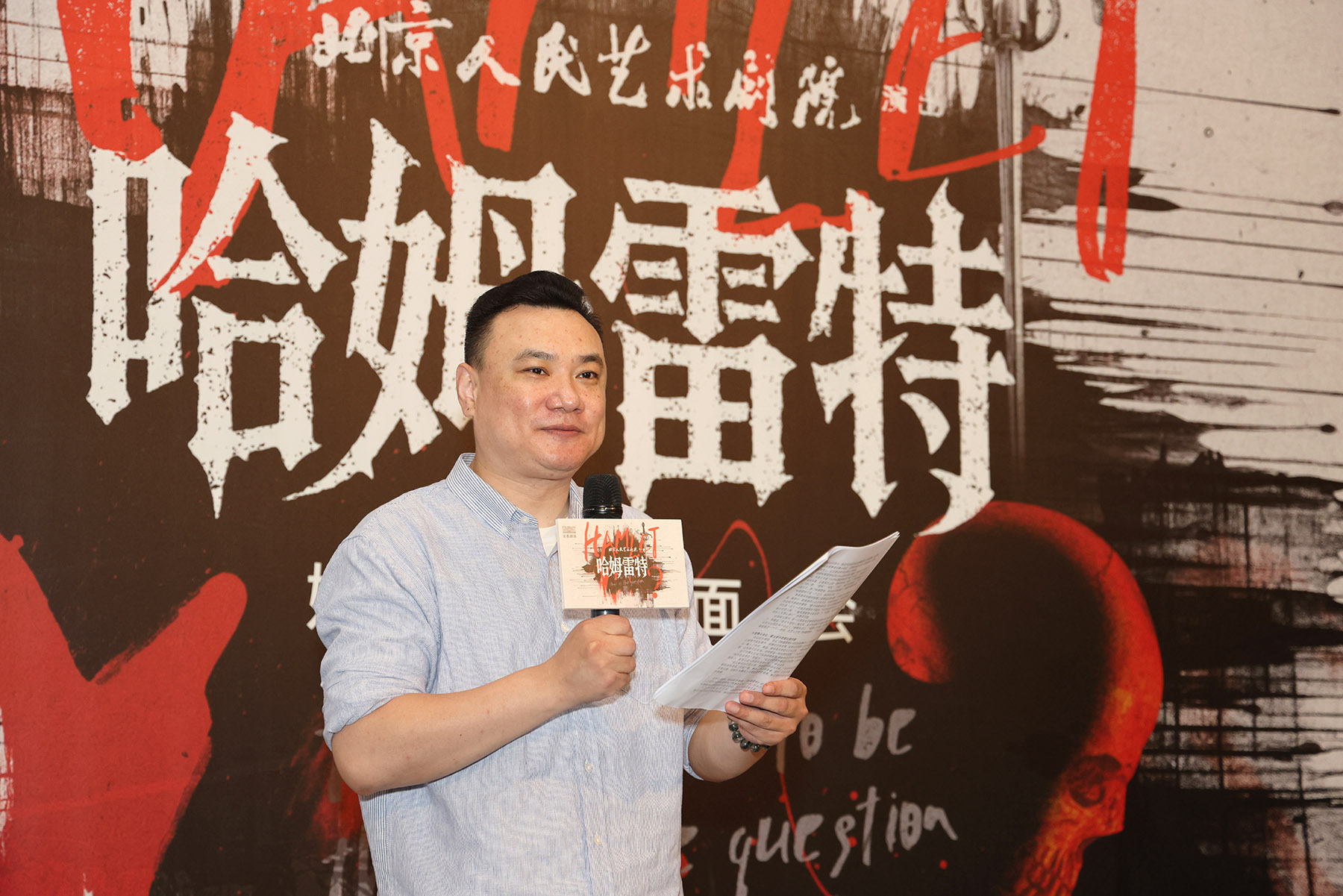Beijing People's Art Theatre to restage Shakespeare's iconic play by combining a new visual approach, talented young cast and a thoughtful exploration of choice and human nature, Chen Nan reports.

More than four centuries after its debut, Shakespeare's Hamlet continues to resonate across generations, an enduring masterpiece that has been reinterpreted countless times in countless languages.
This autumn, the Beijing People's Art Theatre unveils yet another fresh take on the tragedy of the Danish prince's quest for revenge, marking its newest rendition in a series of explorations of this iconic work.
Audiences can expect a bold reinterpretation, designed not only to deliver a dynamic visual experience but also to provoke reflection on the timeless themes of choices, fate, and human nature.
The new rendition will be staged at the Capital Theater from Sept 19 to Oct 12, with 21 performances scheduled.
READ MORE: Hamlet actors stage a triumph
The Beijing People's Art Theatre's relationship with Hamlet spans decades. The first production in 1994 featured Pu Cunxin as the titular prince, with actors and actresses including Chen Xiaoyi, Xu Fan, and Liang Guanhua, bringing to life other key characters. A second iteration in 2008, a collaboration with Japan's Shiki Theatre Company, added an international dimension. In 2023, the theater presented a smaller, experimental version that received critical acclaim for its intimate and innovative approach.

This new grand-scale staging in 2025, directed by Feng Yuanzheng and Yang Jiayin, brings Hamlet back to the main stage with an innovative interpretation that challenges the audience to reconsider the play's most famous line: "To be, or not to be, that is the question".
In a reflective moment, Feng, a veteran actor and the president of Beijing People's Art Theatre, says that performing in Hamlet was always his dream, but circumstances never aligned.
"Instead of stepping into the role of Hamlet myself, I can fulfill that dream through directing. In a way, I've found a new kind of fulfillment in this journey — by guiding these young actors, passing on the essence of Shakespeare's masterpiece, and sharing my understanding with the audience," says Feng.
He went on to explain that his deep connection with Hamlet wasn't just about the character or the plot — it was about the timeless nature of the play and its profound exploration of human emotions, fate, and choices.
"Every actor, regardless of experience, can learn from Hamlet's internal struggle. I wanted to create a space where the younger generation could grapple with that complexity," Feng adds. "Through directing, I impart my interpretation of the play, but I also learn something new each time I revisit its themes with these young minds. It feels like entering Hamlet's world in a different way, and I'm still fulfilling that long-held dream."

For Feng, directing represents a deeper, more lasting engagement with the material than acting could have offered.
"I am glad to help young actors explore such an iconic text," he says. "By guiding them through these universal themes, I can not only share my knowledge, but also help them make their roles their own. It's a profound experience for both the performers and the director, as we all strive to reach a new understanding of what Hamlet means in today's world."
In Feng's vision, Hamlet is not just the story of a young prince torn between duty and desire. The central theme of "making a choice" is brought into sharp focus, extending beyond the protagonist to include characters, each grappling with their own decisions and motivations.
"In the face of the iconic line, 'to be, or not to be', the theme of making a choice in life immediately resonates," Feng says. "Every character has their own choice to make, and their underlying motivations are equally worth our contemplation. This is the core message we wish to communicate to the audience: that we all face choices, at every moment, and we must decide which path to follow."
The new Hamlet features a dynamic and youthful cast, including talented young actors, such as Zheng Yunlong and Lu Lu.

Full of energy and passion, this new generation of performers brings a fresh vitality to the stage, blending tradition with innovation, says codirector Yang.
"These young actors create new ideas at every rehearsal. Portraying such a classic will shape them profoundly," he says, noting that the cast members must master the delicate balance between precision in stage direction and the beauty of Shakespeare's language, while bringing to life characters with rich, vivid personalities.
Zheng emphasizes the universality of Hamlet's struggle. "Hamlet is not just a prince; he is every one of us. Rehearsals have shown me that his challenges are timeless and relatable."
The 35-year-old Zheng has gained a large fan following for his roles in musical productions.
In 2021, he won recognition for his performance as Eben Cabot in the Beijing People's Art Theatre's adaptation of Desire Under the Elms, a three-part tragedy written by US playwright Eugene O'Neill. The successful collaboration with the theater propelled Zheng to become an actor of the theater.

Actress Lu Lu, 28, who plays Ophelia, says that performing Shakespeare is both thrilling and exhilarating.
"The beauty of this work lies in discovering new possibilities through repeated rehearsals," she says. "Ophelia is not just a tragic figure; she is alive, lovable, and, at times, heartbreakingly fragile."
Visually, the production embraces an experimental style. Feng describes a stage featuring suspended ladders, sliding beams, and dramatic lighting that expands the space vertically and horizontally.
ALSO READ: Reviving classics to retell timeless stories
"The audience won't see a castle. Instead, they'll encounter the aesthetic of a decaying theater, intensifying the tension between reason and emotion."
The 2025 production will also open the Beijing People's Art Theatre International Drama Invitation Exhibition. Through this annual global event, the play will engage in a cultural dialogue with international theatrical traditions and explore the evolving nature of Shakespeare's work in contemporary theater.
Contact the writer at chennan@chinadaily.com.cn


